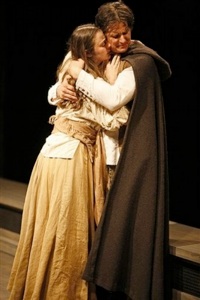Reviews 2008






✭✭✭✭✩
by Carl Zeller, directed by Guillermo Silva-Marin
Toronto Operetta Theatre, Jane Mallett Theatre, Toronto
December 26, 2008-January 4, 2009
“‘Once Again…’”
The Toronto Operetta Theatre last presented Carl Zeller’s 1891 operetta “The Bird Seller” (“Der Vogelhändler”) in 1992. Back then it was the work’s Canadian premiere. Now, at last, we have the chance to hear this thoroughly delightful piece again and to wonder why Zeller’s tuneful and and genuinely comic masterpiece remains relatively neglected outside Germanophone countries. Well-cast, sung and directed, this TOT production makes the best possible case for Zeller’s work.
“The Bird Seller”, appearing just at the very end of the Golden Age of Viennese operetta, is one of the most enjoyable works of the period. The story is clever and complex and contrasts bad judgement borne of momentary pique with calculated deception. The story opens in the village of Clomp-Pop, where the Emperor is coming to hunt wild boar. Unfortunately, the locals are so given to poaching that there are no wild boar left causing the villagers to think of ways of distracting the Emperor from his purpose. In fact, the Emperor is not coming and the devious Baron Weps and his nephew Stanislaus are playing their old ruse of having Stanislaus impersonate the Emperor, gather in the gifts and seduce a local maiden or two before moving on to the next gullible hamlet. It’s no wonder that the censors had Zeller’s regular librettists Moritz West and Ludwig Held transport the action from the Austrian Tyrol to German Rhineland-Palatinate. Director Guillermo Silva-Marin, however, has luckily moved the setting back to the Tyrol where it makes more sense and the idea of an Empress is more comprehensible to North Americans than the “Electress” of the original.
The focus of the plot is the love of the titular bird-seller Adam for the post delivery girl Christel. It has often struck me that “Der Vogelhändler” takes on the question what if the “Vogelfänger” Papageno and his Pagagena were the main characters of an opera. Adam does not make enough money as in his profession to marry Christel and is too proud to apply for the job of the head of the court aviary. Christel, against Adam’s will, decides to submit a petition on his behalf. Unfortunately, she assumes Stanislaus is the Emperor and, worse, Stanislaus insists she present the petition in private. Anyone familiar with 19th-century mores will know that it is scandalous for a peasant girl to be alone with a man without a chaperone, even worse if his is a womanizing aristocrat. In Gilbert and Sullivan’s “Iolanthe” (1882), appearing later in the TOT season, the shepherd Strephon causes a scandal when he is discovered speaking alone with a seemingly young woman he claims is his mother. From this innocent event, here as in “Iolanthe”, a host of misunderstandings spring only to be settled by the finale. Adding to the confusion is the presence in Clomp-Pop of the Empress Elizabeth and her lady-in-waiting Countess Adelaide, in disguise--the former to discover the reason for the Emperor’s frequent absences from court , the latter in love with Stanislaus trying to win him from his wicked ways. The Emperor Franz Josef himself is also present in disguise trying to find out who has been impersonating him.

The smaller roles are all well taken. Linda Gallant is suitable noble as the Baroness Adelaide while Lise Maher and Catherine Rooney are warmly comic as Jette and Emmerenz. Stefan Fehr and Justin Ralph have an exceptionally fine comic turn as the easily bribable zoology professors Süffle and Würmchen, in a scene that seems more in the satiric mode of Gilbert and Sullivan than Austrian operetta. The choral passages throughout are beautifully sung.
TOT Artistic Director serves as scenic designer and lighting designer and well as director and does all his tasks with finesse and élan. He has pioneered a style of operetta production that places the emphasis on the music and the acting that serves this genre well. Derek Bate conducts the 16-piece orchestra with a real sense of style and enthusiasm. In fact, my only criticism is that bate may be a bit too enthusiastic since the orchestra on occasion overwhelms the singers in their lower register. All in all, “The Bird Seller”, with its emphasis on forgiveness, is a most civilized way to see out the old year or ring in the new. Frequent acquaintance only increases one’s affection for the piece. Let’s hope we’ll won’t have to wait another sixteen years to hear it “Once again”.
©Christopher Hoile
Note: This review is a Stage Door exclusive.
Photo: (top) Keith Klassen and Allison Angelo; (middle) Lise Maher, Allison Angelo and James McLennan. ©2008 Gilberto Prioste.
2008-12-30



The Bird Seller






